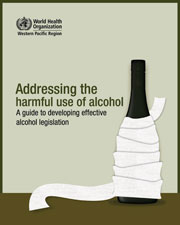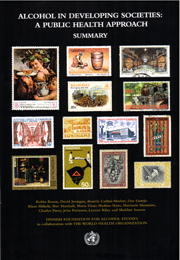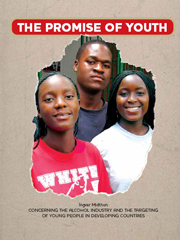
Draft Global Alcohol Strategy goes to WHO Executive Board
The Executive Board of the World Health Organization will discuss a Draft Global Strategy to Reduce Harmful use of Alcohol in its January 2010 meeting. The documents, including the draft strategy are now available.
The draft strategy points out that the harmful use of alcohol can be reduced if effective actions are taken by countries to protect their populations. It also observes that all countries will benefit from having a national strategy and appropriate legal frameworks to reduce harmful use of alcohol, regardless of the level of resources in the country. The draft strategy presents comprehensive lists of policy options in ten areas;
- Leadership, awareness and commitment;
- Health services’ response;
- Community action;
- Drink-driving policies;
- Availability of alcohol;
- Marketing of alcohol;
- Pricing policies;
- Reducing the negative consequences of drinking and alcohol intoxication;
- Reducing the public health impact of illicit alcohol and informally produced alcohol; and
- Monitoring and surveillance
Suggested interventions include eg. specific alcohol taxation and an effective enforcement system, regulating the content and the volume of alcohol marketing, regulating the number of alcohol outlets and days and hours of sale. The recommendation is that such control policies are combined with community mobilization, information and awareness raising and early interventions.
The WHO document stresses the need for strong leadership and a solid base of awareness and political will if actions shall be sustainable. “The commitments should ideally be expressed through adequately funded comprehensive and intersectoral national policies that clarify the contributions, and division of responsibility, of the different partners involved”. It goes on to point out that “The engagement of civil society is essential “
The document EB126/13 consists of three parts: The report by the secretariat, including a draft resolution for consideration by the WHO Executive Board; Annex 1 – the draft strategy itself; Annex 2 – a two page summary of the evidence for the effectiveness and cost-effectiveness of interventions. In addition there is also a bibliography on evidence on harmful use of alcohol published in a separate document.
The report by the WHO secretariat outlines the process by which WHO has collaborated with the Member States and how various consultations have been conducted before the final draft is now put before the Executive Board. In August a working document was sent to Member States and WHO received feed back from some of them. Further to this an informal consultation was held in Geneva in October, before the present draft was developed.
Compared to the Working Document which was published in late August, there are some changes in the draft strategy. The structure of the document is more or less the same. In the Policy options and interventions section the “Core components”, “Measures to support and complement actions at national levels” and “Implementation considerations” for each policy area has been removed, but some of the text is incorporated other places.
The Annex 2 summarizes the evidence base for the draft global strategy.
The global strategy will be discussed by the WHO Executive Board meeting in January and by the World Health Assembly in May 2010.
See the documents here:
WHO web page documenting the development of the global strategy
Documentation for WHO Executive Board.
Related articles
![]()
![]()
Developed with CustomPublish CMS by Nettinfo AS




